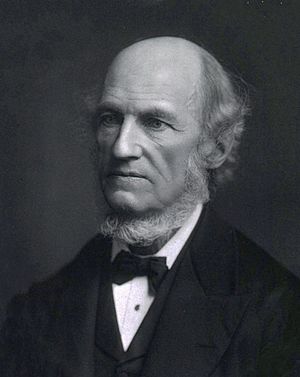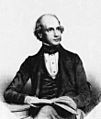William Benjamin Carpenter facts for kids
Quick facts for kids
William Benjamin Carpenter
|
|
|---|---|
 |
|
| Born | 29 October 1813 |
| Died | 19 November 1885 (aged 72) London, England
|
| Resting place | Highgate Cemetery |
| Alma mater | |
| Occupation | Physiologist, neurologist, naturalist |
| Years active | 1839–1879 |
| Title |
|
| Spouse(s) | Louisa Powell (1840–1885) |
| Children | Five sons |
| Parent(s) |
|
| Relatives |
|
| Awards |
|
| Signature | |
William Benjamin Carpenter (born October 29, 1813 – died November 19, 1885) was an English doctor. He studied animals without backbones (invertebrates) and how living things work (physiology). He also helped set up the early University of London.
Contents
Life and Education
Carpenter was born in Exeter, England, on October 29, 1813. He was the oldest son of Dr. Lant Carpenter and Anna Carpenter. His father was an important Unitarian preacher. From his father, William learned to believe that the world followed natural laws. He thought that explanations for things could be found through physical causes.
In 1828, Carpenter began training with an eye surgeon named John Bishop Estlin. He attended medical lectures in Bristol. Later, he studied at University College London from 1834 to 1835. He then went to the University of Edinburgh, where he earned his medical degree (MD) in 1839. In 1845, he became a member of the American Philosophical Society. The University of Edinburgh gave him another degree, an LL.D., in 1871.
Carpenter retired in 1879. He was given the title of Companion of the Order of the Bath (CB) for his work in education. He died in London on November 19, 1885. He was buried in a family grave at Highgate Cemetery.
Career and Discoveries
Carpenter's graduation paper was about the nervous system of animals without backbones. This paper won a gold medal and led to his first books. In 1844, he became a Fellow of the Royal Society because of his work in studying and comparing nervous systems.
In 1845, he became a professor of physiology at the Royal Institution. He was known for being a great teacher and speaker. He could explain science clearly, which was important when science was just starting to become popular.
Deep-Sea Exploration
Carpenter was very interested in marine zoology, which is the study of sea animals. He focused on tiny organisms like foraminifera and crinoids. His research helped start deep-sea exploration.
He worked with naturalist Charles Wyville Thomson. Together, they led exploration trips on the ships HMS Lightning and HMS Porcupine. These trips took place in northern Scotland from 1868 to 1870. Carpenter used the information from these trips to create a new idea about how ocean currents move around the world.
His efforts helped convince the British government to start a huge ocean exploration trip. This led to the HMS Challenger journey from 1872 to 1876. This was the world's first major oceanographic expedition.
Microscope and Awards
Carpenter was skilled at using the microscope. His popular book about the microscope encouraged many people to use this new tool. In 1861, he received the Royal Medal for his scientific work.
In 1856, Carpenter became the Registrar of the University of London. He held this job for 23 years. He also supported the education of women. He taught at the new Bedford College, London in 1849 and 1850.
Understanding the Mind
Carpenter is seen as one of the people who helped create the modern idea of the adaptive unconscious. This is the idea that our minds do a lot of thinking and processing without us even knowing it. He observed that our senses often work outside of our conscious awareness.
He noticed that the more he studied how we think, the clearer it became that much of it happens without us being aware. He also believed that unconscious ideas can be stronger than conscious thoughts. He thought they were more dangerous because they happen without us realizing it.
Views on Paranormal Claims
Carpenter was a critic of claims about paranormal phenomena, like ghosts or psychic abilities. He called them "widespread false beliefs."
He wrote a book called Mesmerism, Spiritualism, Etc: Historically and Scientifically Considered (1877). This book is considered an early text in anomalistic psychology, which studies strange human experiences. Carpenter believed that spiritualist practices could be explained by psychological reasons, such as hypnotism and suggestion. He did not believe in any magical or supernatural reasons for hypnotism. He said they were fully explained by how the human mind works.
He also argued that the ideomotor effect could explain things like dowsing (finding water with a stick) and table-turning. Michael Faraday, a famous scientist, gave Carpenter credit for explaining the results of his experiments with tables.
Carpenter believed in a divine first cause, meaning he thought there was a creator. Even though he was known for debunking strange claims, his scientific ideas were also shaped by his Unitarian beliefs.
Family Life
Carpenter married Louisa Powell in 1840 in Bristol. Louisa was born around 1815–1820 and died in 1885. They had five sons.
Two of their notable children were:
- Philip Herbert Carpenter (1852–1891): He was a zoologist and a teacher at Eton College. He helped his father and wrote a lot about fossils.
- Joseph Estlin Carpenter (1844–1927): He was a theologian and a Unitarian.
Works
See also
 In Spanish: William Benjamin Carpenter para niños
In Spanish: William Benjamin Carpenter para niños
- European and American voyages of scientific exploration
Images for kids
 | Roy Wilkins |
 | John Lewis |
 | Linda Carol Brown |


